Teachers made $1.25 a day in P.E.I.'s Bygone Days
Reginald "Dutch" Thompson's column The Bygone Days brings you the voices of Island seniors, many of whom are now long-departed. These tales of the way things used to be offer a fascinating glimpse into the past. Every few weeks, CBC P.E.I. will bring you one of Dutch's columns.
School is back in session across P.E.I., with many changes due to COVID-19.
Looking back over the last 100 years or more, P.E.I. teachers, students and institutions have witnessed many dramatic changes, perhaps none more so than the consolidation of the Island's one-room schoolhouses in the early 1970s.
Another big change is that until the 1970s, everyone got two weeks off in the fall to pick potatoes. This was when potatoes were dug up in rows and picked by hand, or farmers had smaller mechanized harvesters than they do today.

Bertha Ross was born in 1911 and attended the Little Pond School.
"There wasn't summer vacation then, that came afterward," Ross told Dutch. "There was two weeks in the spring for spring work and two weeks in the fall for potato digging. But there was no long summer vacation."
Ross said she was especially busy on her so-called "vacation," because her mother had taken over the family's farm when Bertha's father died.
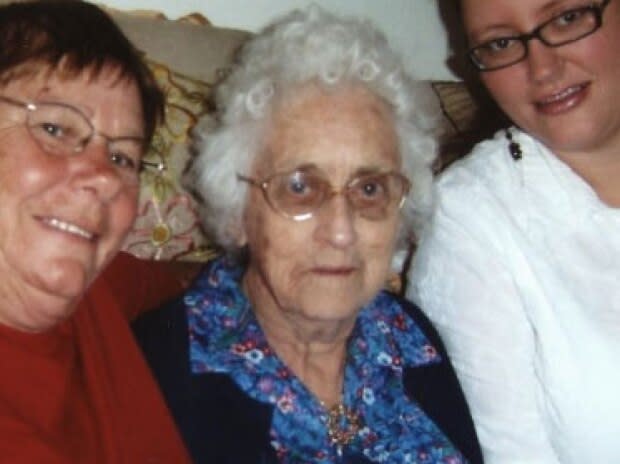
"We were never bored! We didn't have time to be bored. If we could get time to sit down and read a little book, we thought we had the world by the tail," she said.
Those were tough times but Bertha came through OK, going from from the one-room school to business college in Charlottetown and then full circle — she taught school for four years.
Ross said some years at the Little Pond Schoolhouse there were as many as 50 students and just one teacher.
At one point, back in 1925, P.E.I. had 415 one-room schools, as well as 41 two-room schools. By 1973 there were 55 one-room schoolhouses and several two-room schools.
Vacations were chore time
The timing of vacations during P.E.I.'s school year started way back in 1839 — because so many students were absent for farm work, the government legislated school vacations around planting and harvesting: 10 days in May and 11 days in October.
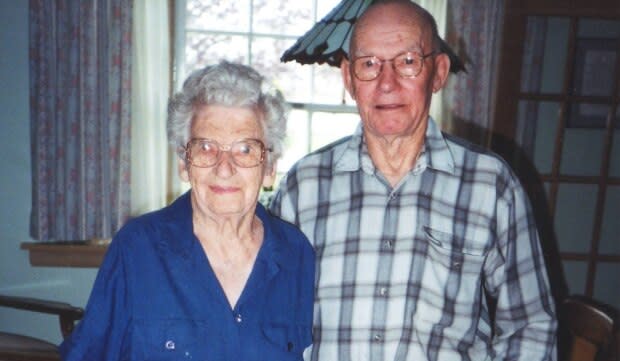
In some school boards, including Beach Point down east, vacation was three weeks in the spring and three weeks in the fall, so the children could help with both farming and fishing chores.
The teachers were so poorly paid — as little as $300 for the whole year — some teachers like Dorothy (MacKenzie) MacLure, who began teaching in 1929, went potato-picking too.
"Potato digging time, school would be closed for a month in the fall for potato digging. Started in the middle of August, sometimes the first of August if you had a month off," she recalled, adding of the work of digging: "I never liked it."
She and her sisters and neighbours would go to nearby farms — that's how her older sister Nettie (Jeanette) met her husband, who had a farm in Freetown.
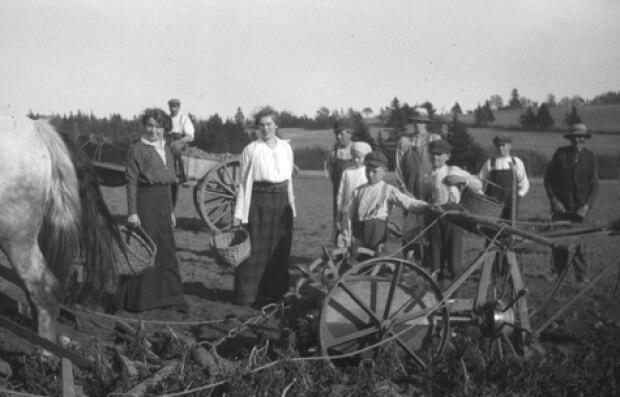
"We were into the field at seven every morning, we never left till six. It wasn't easy to put the potatoes into those bags either. I'd spill them, and then you'd have to pick them up and put them in the bag," she said. They were paid $2 a day for potato picking, MacLure said, which "wasn't too bad for those times," adding her father had worked for 25 cents a day when he was young.
MacLure made about $1.25 a day teaching in South Granville, or $425 a year. The P.E.I. government paid $350, and the local school board topped it up by $75 with the "supplement" as it was called. Seventy-five dollars was a low-end supplement. Each district paid what they could afford, so the good teachers like MacLure were often lured away by the promise of a higher supplement.
MacLure was only 17 when she started teaching, and some of her students were bigger than she was. But she said she only used the strap once in her long career.
Pranks and practical jokes
The old West Kent School which was on Kent Street in Charlottetown is long gone now. It was at the west end of Kent Street, down where the P.E.I. government buildings are now, the Jones and Shaw buildings.
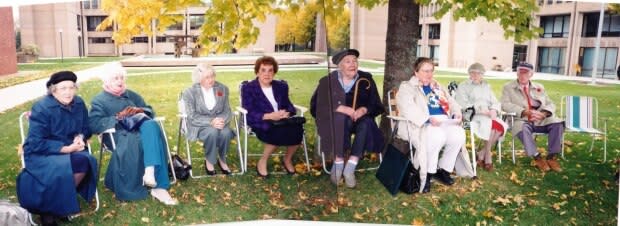
Even though the school is long gone, back in 1999 some former West Kent students and teachers had a joyful reunion near the site of the old school.
Dutch brought along his tape recorder and captured some of the memories of the early years at the school, including the pranks and practical jokes the students used to play on their teachers.
"I was always late getting up, my grandmother used to natter at me and whatever, and Bessie Prouse, dear soul that she was, was in charge of ringing the bell," said Mary Ramsay, who lived very close to the school. Prouse had a student ring the bell once outside before 9 a.m., then again inside the school at nine sharp.
"I would leave my door when I would hear the last bell start to ring. I would race across here -- and it was very important that you be on time at school — and I would race in the front door, up the stairs, and Bessie Prouse would be standing over in the corner wagging her finger at me," Ramsay said. However, Prouse obligingly kept the student ringing the bell until Ramsay could make it upstairs to her top-floor classroom, so she wouldn't be marked as late.
Ramsay also recalled a story of a student who would go to his father's grocery store at lunchtime, bringing back walnuts in the shell to pass out to fellow students. The students would lean on the walnuts and crack them loudly during class, and their young teacher Ms. Crosby would run around the class trying to figure out where the noises were coming from.
"The poor soul, we really did it to her, I'm telling you!" Ramsay said with a laugh. She then apologized for herself and her-walnut-cracking cronies — 60 years later.
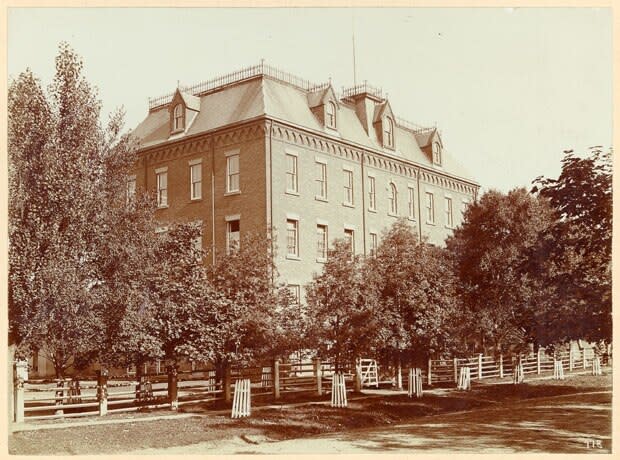
That teacher, Grace (Crosby) Mutch, also attended the reunion. She remembered her first cheque being for $41 for three months' work.
"We began to find there was adequate compensation when the men came into the teaching profession, then we began to get more money," Crosby said, noting the male teachers were also paid more.
The group also remembered how one West Kent teacher demonstrated his dexterity by rolling cigarettes behind his back, which was most impressive to the young boys in his homeroom.
Dutch recalled his own Grade 1 teacher Mrs. Preston had also taught his father and assumed Dutch was going to be the hellion his father was, so was quick to give Dutch the strap the first time he erred in his ways.
More from CBC P.E.I.


